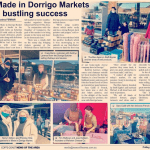
How do wheat farmers survive the ups and downs of good years and bad years? They Plan for Zero. Photo by Becky McCray.
There will be times in business when your income is zero. You might as well plan for that right now.
For farmers, a wheat crop might be entirely hailed out, and they may lose the entire year’s income. They have to plan for that or it’s going to put them out of business. The same thing can happen to any business. There will be times when at least part of the business generates zero income, whether that’s a zero for the month or a zero for the year.
Small town people use a couple of different tactics to plan ahead for those lean times. One tactic is to think long term. Knowing that I have to plan for five years of really variable income, what I can do now to make that better? That’s taking a really long term perspective.
When my friend Rob Hatch‘s business received a windfall of unexpectedly strong sales, he said he kept thinking to himself, “plan for zero, plan for zero.” So he set aside money for future lean times. That’s taking a long term perspective.
The other tactic is cultivating multiple lines of income. This also comes from farming. If you know that your entire wheat crop may fail, then you may also plant milo or soybeans, or you may take in livestock and raise cattle to help even out the variation.
That’s also something that any of us can do. We can look at our business and say, “What would be another line of income that would be compatible here that would help even out some of the volatility that I know we’ll face?”
Small town people also extend this further, to even unrelated businesses, like say a liquor store and a cattle ranch. When the cattle market is headed down then we like to hope that the liquor market at least will be stable or maybe will be up.
Plan for Zero is one of the Small Town Rules that any business can use to thrive in today’s economy.
New to SmallBizSurvival.com? Take the Guided Tour. Like what you see? Get our updates.
- About the Author
- Latest by this Author
Becky started Small Biz Survival in 2006 to share rural business and community building stories and ideas with other small town business people. She and her husband have a small cattle ranch and are lifelong entrepreneurs. Becky is an international speaker on small business and rural topics.










